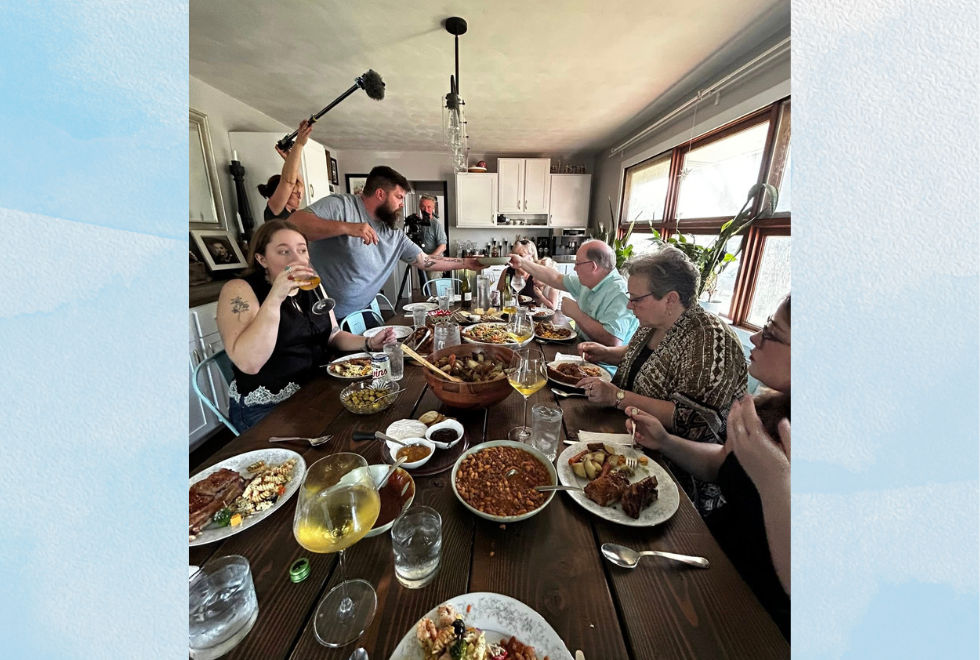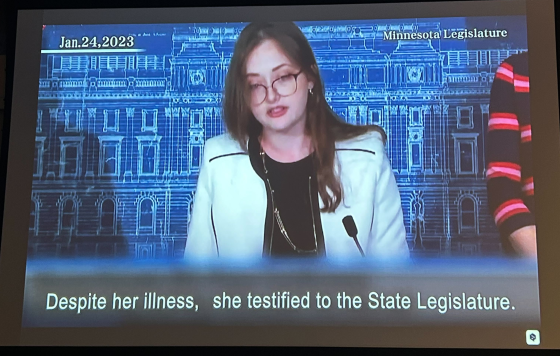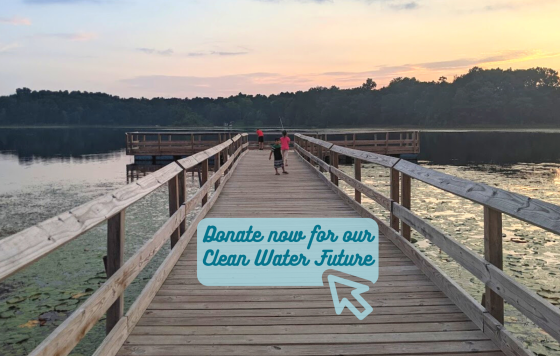
Last week a film crew from France was in Minnesota. Their goal was to gather information about Amara’s Law. They wanted to understand how Minnesota was able to pass such an impactful law in 2023, while also weaving in the personal stories of the people connected to it – those of us who have worked to pass the law, as well as those who have been directly impacted by PFAS.
Now, it’s important that you know that my life is rather chaotic – and I like it that way. I am a school board member, I sit on my city’s Environmental Quality and Energy Commission, I am a part of our police advisory committee, I’m on the board for the Alliance for Sustainability, and I have a 21-year-old and a toddler. Our house is busy with our dog and cat, and there’s always a neighbor or two passing through our screen door. It’s wonderful.
So, when I was asked if they could film in my house, there was some mild panic. If you ask my husband, he’ll exaggerate and claim that I ran him morning to night with painting walls and other home repairs… I plead the fifth.
When the panic subsided, I was filled with excited nervousness. Swallowing my imposter syndrome, I knew that this story had to be told. OUR Minnesota story had to be told. The story of Amara’s Law isn’t about any one person or any one moment. It’s decades of hidden secrets, undisclosed scientific proof, and sick and dying loved ones. While I can tell the story of Amara’s Law from my perspective, it isn’t wholly mine. It isn’t wholly anyone’s.
I worry when I speak about Amara’s Law that we are losing the human story in the political intrigue and drama. But then I remember that the two go hand in hand. We can’t have one without the other when talking about how Minnesota came to be the home of the most comprehensive ban on toxic PFAS in the country (and the world).
I am constantly asked what made 2023 different. Minnesota successfully passed a ban on PFAS in food packaging in a previous session and the consumer product bills had been tried before, but failed. The obvious answer is that Amara and the Strande family made all the difference. Derek Lowen, Ben Rule, other environmental organizations, health care professionals, and other impacted Minnesotans all came forward to tell their story. They all made the difference. We built a coalition that truly cared. There’s no amount of money that can be funneled into corporate lobbyists can resist that kind of passion and tenacity.
While the DFL trifecta did play a role in keeping the bill strong, we can’t forget that Amara’s Law had bipartisan support – and still does. Rather than focusing on the politics and partisanship of passing a bill, we focused on the humanity of doing the right thing for all our families.
I had a one-on-one interview with the film crew, and then Mike (the poor guy who had to do all the hasty house projects) and I brought them out on our boat for a tour of Lake Elmo – which unfortunately suffers from very high levels of contamination. We circled the lake and admired the beautiful houses. I explained to them that having a house on the lake in Minnesota is something everyone strives for. Our culture is rooted in water – swimming, boating, and fishing fills our hearts and our bellies year-round. The tragedy of such a beautiful lake being so toxic seemed to really captivate them.
The next day was Mother’s Day. (And yes, for all of those who are familiar with the story, I am skipping the part where I fell off the boat.) When the crew pulled up, my toddler Huntley ran to meet them. He absolutely adores them, and he waved furiously and ran as quickly as his little legs would carry him to greet them. I made a huge American BBQ – ribs, potatoes, loaded baked beans, and my mom’s pasta salad. The Strandes joined us, and we toasted to our new friends and, of course, Amara.
They filmed our life and how we interact with water. There were fun moments, like introducing our French friends to Dairy Queen, Huntley being filmed with a full face of face paint on thanks to a birthday party, and all of us coming together for a meal. And there were moments of – not sadness – perhaps I’ll call it “reflection.” I can’t help but wonder what life in Minnesota and around the world would be like if the use of PFAS was halted when the science first showed the harm that exposure can cause to human health. What if rather than investing in powerful lobbyists to skirt regulations, the chemical industry invested in research and development for safer alternatives? What if consumers were aware of what is in the products they buy and the water they drink? Could that information urge the market towards safer alternatives?
When the last 7 decades of PFAS’s existence is examined, one can’t help but note all the moments where one voice, one pause, one choice could have made the difference. If studies had been acted upon… If human health been prioritized over profit… so many “ifs” — it all makes my heart hurt.
We can’t go back. We can only go forward. We can focus on the bravery and dedication of those who fought back. Representative Jeff Brand refused to compromise and held firm to ensure the bill would not be watered down. Amara, Ben, and Derek told their personal and private stories for the world to hear. Senator Seeberger stood up to industry and shared her family’s story. Clean Water Action and the Minnesota team worked with partners, studied every facet of the chemical family, and spent sleepless nights ensuring the bill would move forward. While we should never forget what the chemical industry knew and when they knew it – we must also focus on the good. We must focus on the continuing journey. We must be aware of the ongoing threats posed to the law, our water, and our health.
Our state is setting an example for the world. We can never lose sight of that. We have to keep pushing. France, Japan, England, Australia have all reached out to work with us and understand more about Amara’s Law. Now is not the time to slow down—we’re just getting started!




